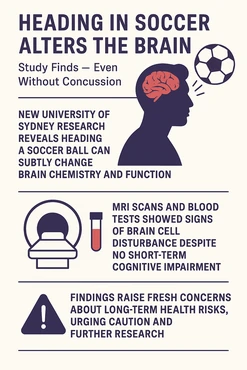MRI scans and blood tests showed signs of brain cell disturbance
-
New University of Sydney research reveals heading a soccer ball can subtly change brain chemistry and function.
-
MRI scans and blood tests showed signs of brain cell disturbance despite no short-term cognitive impairment.
-
Findings raise fresh concerns about long-term health risks, urging caution and further research.

A world-first study led by the University of Sydney has uncovered subtle but measurable changes in the brain following routine heading of a soccer ball even in the absence of concussion or immediate cognitive symptoms.
Publishedin the journal Sports Medicine - Open, the randomized controlled trial used advanced Magnetic Resonance Imaging (MRI) to examine the brains of 15 adult male soccer players who headed a ball 20 times in 20 minutes under tightly controlled conditions. The results showed altered brain chemistry and decreased electrical conductivity in multiple brain regions changes that may affect energy use and information transmission through white matter.
The study also found increased levels of two blood biomarkers GFAP and NFL which are considered reliable indicators of brain injury and have been linked to elevated dementia risk. Although the levels were well below those seen in diagnosed brain injury cases, researchers say the subtle elevations suggest a biological response to microstructural disruption in brain cells.
No cognitive impairment
No cognitive impairment was observed in the players immediately after heading, said Dr. Nathan Delang, who led the study as a PhD candidate at Griffith University. But the presence of these biomarkers tells us that heading can subtly disturb brain cells and that deserves further investigation, especially with regard to long-term exposure.
The research was conducted at the University of Sydneys Lambert Initiative for Cannabinoid Therapeutics, under the guidance of Professor Iain McGregor, and supported by the imaging facilities at Neuroscience Research Australia (NeuRA). The study stands out as the first of its kind to combine MRI brain imaging, blood biomarker analysis, and cognitive testing to isolate the effects of heading compared to kicking.
Dr. Danielle McCartney, a co-author of the study, emphasized that while the results don't prove heading causes dementia, they highlight the importance of caution: These findings suggest that even routine, symptom-free heading can produce subtle changes in the brain. The next step is to determine whether such changes accumulate over time and what implications they might have for long-term brain health.
The findings arrive amid growing international concern over heading in youth and professional soccer. Several countries, including the U.S. and U.K., have introduced restrictions or bans on heading in younger age groups. While Australia has yet to enact similar measures, the conversation is gaining momentum.
The research also opens the door to exploring potential protective strategies, including dietary interventions and cannabinoid-based therapeutics.
Citation:
Delang, N. et al. Sports Medicine - Open. DOI: 10.1186/s40798-025-00867-0
Posted: 2025-06-20 01:53:56




















